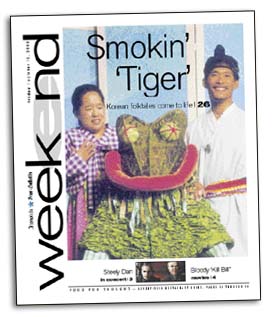
[ WEEKEND ]
BRAD GODA / HONOLULU THEATRE FOR YOUTH
"When Tiger Smoked his Pipe" is being staged as part of the centennial Korean celebrations.
Catching
‘Tiger’s’ tales
Bonk, bonk, tap! "Looooong ago ..." A narrator begins yet another tale with the resonant and percussive punctuation of striking one of two heads and wooden barrel of a drum.
Taking its inspiration from the spirited Korean storytelling tradition of p'ansori, the latest Honolulu Theatre for Youth production revolves around a trio of Korean folk tales as brought to life by a fine ensemble cast of company actors.
'When Tiger Smoked His Pipe'
Presented by Honolulu Theatre for YouthWhere: Richardson Theatre, Fort Shafter
When: 1:30 and 4:30 p.m. Saturday, repeating Oct. 18 and 25, and Nov. 1
Tickets: $12 adults, $6 youths 3 to 18 and senior citizens 60 years and older
Call: 839-9885
"When Tiger Smoked His Pipe" is being staged to coincide with the yearlong celebration of the centennial of Korean immigration to the United States, touching these islands. The play's success can be credited to the help of a renowned singer and p'ansori expert, and an equally recognized writer and her young daughter.
Chan Park got involved with the HTY play at the request of director Mark Lutwak, who then trained the actors in p'ansori -- traditional storytelling accompanied by drumming that embellishes the action -- for several weeks before rehearsals began. She worked particularly closely with Herman Tesoro Jr. for his role as narrator.
But Park had to make sure that, in her mind, the Korean tradition would be well-served by the play.
"In order for me to feel the motivation," Park said after a special Sunday afternoon performance at the Honolulu Academy of Arts theater, "the context of presenting p'ansori had to be correct. It's such a special relationship between music and words. I didn't want to distort it too much unless it gave a meaningful momentum to the play."
"With the use of p'ansori," Lutwak added, "it makes the tales that more emotionally accessible and direct. As Chan was teaching the actors, I saw how much more immediately engaging they were making the play."
"It's all about striking the right balance," Park said. "Even with actors as brilliant as these are, I cannot expect them to learn the full p'ansori experience in a couple of weeks' time.
"I also had to consider the audience, which is mostly children, so we had to make something more digestible for both them and the actors. And we also had to find other ways of accessibility, so we threw in a little local humor."
That comes to play in the final tale of "The Toad Bridegroom," in which a masked Squire Coldwell turns in an exuberant performance as a prince-turned-into-a-toad fished out of Wahiawa's Lake Wilson and cared for by a couple, played with broad and sympathetic comedic flair by Reb Beau Allen and Cynthia See. Monica Cho Coldwell also does a fine turn as the exasperated betrothed to the toad prince.
THE GENESIS of "When Tiger Smoked His Pipe" -- an expression that is the Korean equivalent to "once upon a time, when both man and beast cohabited before the two lived in their own worlds -- came from author Nora Okja Keller.
Keller had written a short folk tale play for HTY in 1998 and last year, after finishing her second novel "Fox Girl," she came to the theater group with the idea of combining several Korean folk tales into one children's play.
But she didn't want to do this alone, enlisting the help of her daughters Tae and Sunhi to select three of their favorite stories as read to them from books by their mom and told by their grandmother. From there, Keller and Tae -- who at 10 seems to have inherited her mom's writer's instinct -- went to work.
Keller said she wanted to combine the three folk tales "with a fourth as a framework, so I chose something called 'The Storybag,' where the main characters would jump out of the narrator's bag, demanding that their stories be told."
Along with "The Ox Mask" and especially the leadoff "Tiger" story of "Sun and Moon," Keller and her daughter wrote the dialogue and the action, and played with broadening the stories' humor.
With every script reading and rehearsal, the two saw their words and stage directions come to life. "One of the big changes we saw was in the non-verbal things the actors did," Keller said. "They added and enhanced so much of what we wrote. It was a real joy to watch."
Plus, the experience has spurred Tae in her writing. Even though the girl shyly demurred to her more media-savvy mom during the interview, the Punahou School fifth grader can now add another piece of writing to her growing resume. She's already had three poems published in Stone Soup and Teen Ink, and she's subbed once for her mom's Sunday Star-Bulletin column, "Small Moments," when mom needed a vacation.
Click for online
calendars and events.


